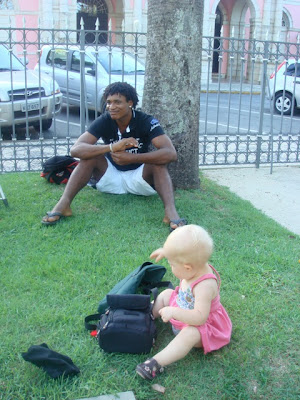 Helena can now recognize the covers of different books, so we can see more clearly which are her favorites: she picks them up and brings them to us. Unfortunately, two of her favorite books are a retrograde interpretation of the three little pigs (which turns it into a morality tale about laziness, like the fable of the ant and the grasshopper) and a sad tale of a boy her turns into a werewolf and is forced from his home by his friends and family... and the book ends that way, without the redemption of a happy ending.
Helena can now recognize the covers of different books, so we can see more clearly which are her favorites: she picks them up and brings them to us. Unfortunately, two of her favorite books are a retrograde interpretation of the three little pigs (which turns it into a morality tale about laziness, like the fable of the ant and the grasshopper) and a sad tale of a boy her turns into a werewolf and is forced from his home by his friends and family... and the book ends that way, without the redemption of a happy ending.Now, I could use this blog as a chance to reflect more on the nature of narrative, and suggest that babies don't want the simple beginnings and ends, nor the moral of the story, that we adults want for them. What's more interesting is what Helena likes about the two stories: the wolves. At the beginning of each story (the boy before he becomes a werewolf, the three little pigs setting off for the world), she can't even wait for the narration to end before she tries to turn the page, but then, when the wolves appear on the page, she begins to growl. Loudly. Furiously. And with unmistakable joy.
What is Helena Iara up to? Why these joyful growls? Here's a hypothesis: where we adults have learned to identify heroes and villains, and to identify with the heroes, Helena is putting herself in the shoes of other characters. She doesn't find the pigs sympathetic (I never really did, either), but the wolf is exciting, powerful, and goes after what he wants. Even more important is that the wolf has a cool voice when I read the story, with intonation and accent and (yes) growls. "And I'll huff and I'll puff and I'll blow your house down!" That's much more fun that a bunch of whiney little pigs.
 We might look at lots of children's literature through these eyes: might the kids not like the three bears more than Goldilocks? The big bad wolf more than Little Red Riding Hood? Shrek, in its best moments, seems to capture this intuitive reversal: kids like the powerful excluded monster more than they like the goody-two-shoes.
We might look at lots of children's literature through these eyes: might the kids not like the three bears more than Goldilocks? The big bad wolf more than Little Red Riding Hood? Shrek, in its best moments, seems to capture this intuitive reversal: kids like the powerful excluded monster more than they like the goody-two-shoes.Moralists might be worried about this idea, but I don't think they need to be. Not to say that I am any kind of saint, but I think I'm a pretty decent person, but the role I always wanted to play, whether playing as a little boy or in theater as a teenager, was the villain. I wanted to explore bad to find out what it was like, to understand bad people... but not to be it. I've seen the same thing making fictional films with child soldiers and street children and other "bad kids": when they have a chance to explore evil in fiction, they need it less in real life.




Helena reminds me so much of you and David as children - so busy learning and so curious about all the things around. She is a lucky little girl to have you as a daddy and Rita as a mom.
ReplyDelete